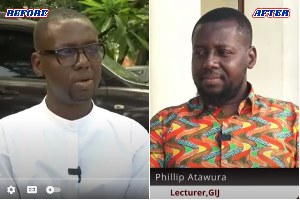An assistant lecturer at the University of Media, Arts, and Communication (UniMAC-GIJ), Philip Atawura, has shared the challenges he faced during his kidney transplant journey in India, explaining how he nearly abandoned the procedure due to unexpected setbacks.
Speaking with Etsey Atisu, the Host of The Lowdown, on GhanaWeb TV, he detailed how a trip initially planned for three months dragged to eight months due to legal and medical hurdles they did not anticipate around his donor, among other issues.
“I left Ghana on the dawn of August 25, 2023, travelling through Ethiopia to India, which took a total of 14 hours. The flight to India was smooth because I had thoroughly prepared for it. I made sure to complete my dialysis a day before to prevent water accumulation in my legs. Additionally, I underwent all the necessary tests before embarking on the journey," he said.
Upon arrival in India, he resumed dialysis immediately, but it wasn't until after three weeks that he had his first consultation, as he had to wait for his donor to join him.
“The following day, I arrived in India, where I immediately resumed dialysis. My first consultation took place after three weeks because my donor joined me two weeks later, and we needed to consult together. Upon landing, it was 12 PM, and since India is a vast country, it took about an hour and thirty minutes to travel from the airport to the hotel. The next day, I registered at the hospital and began my dialysis sessions," he explained.
He said India has strict requirements for organ transplants as part of efforts to ensure that organ trafficking is prevented, which they were not aware of.
“I went to India with my fiancée, and two weeks later, my donor joined us. However, upon our arrival, we discovered that I needed to be accompanied by a family member, and the donor had to be accompanied by either their wife or mother. We were required to obtain affidavits to show their consent for the surgery.
“The issue was that the hospital failed to inform us that we would have to meet a legal committee responsible for approving surgeries like mine. The committee ensures that organ harvesting is not taking place. What I didn’t know, and my doctors in Ghana were also unaware of, was that India does not permit non-related donors for organ transplants. After spending a month running preliminary tests, we were told we needed to undergo a DNA test. When I asked why, they explained that if the donor’s DNA didn’t match mine, they couldn’t proceed with the surgery," he explained.
Philip Atawura noted legal hurdles significantly delayed his kidney transplant.
These setbacks affected him psychologically and made him even contemplate abandoning the transplant.
“I was greatly affected psychologically. Somewhere in December, when we tried the second time, we decided to come to Ghana. The advice we had was to stay and do whatever it takes to get it done.
"A source in the Ghana Embassy said they didn't trust doing it in Ghana and had a fear of not having a successful transplant in Ghana. All of these reasons gave us a reason too keep pushing," he stated.
The lecturer expressed gratitude to his donor and his partner for all their support throughout the transplant and recovery process.
“It is unbelievable; under no normal circumstances will somebody leave their job and come and be with you," he stated.
Watch the video below:
JKB/AE
In the meantime, follow Ernestina Asante as she tours the Asokwa Constituency and speaks with MP Patricia Appiagyei in this episode of Campaign Trail on GhanaWeb TV:
General News of Wednesday, 23 October 2024
Source: www.ghanaweb.com
Why this Ghanaian lecturer nearly abandoned a kidney transplant in India
Entertainment












